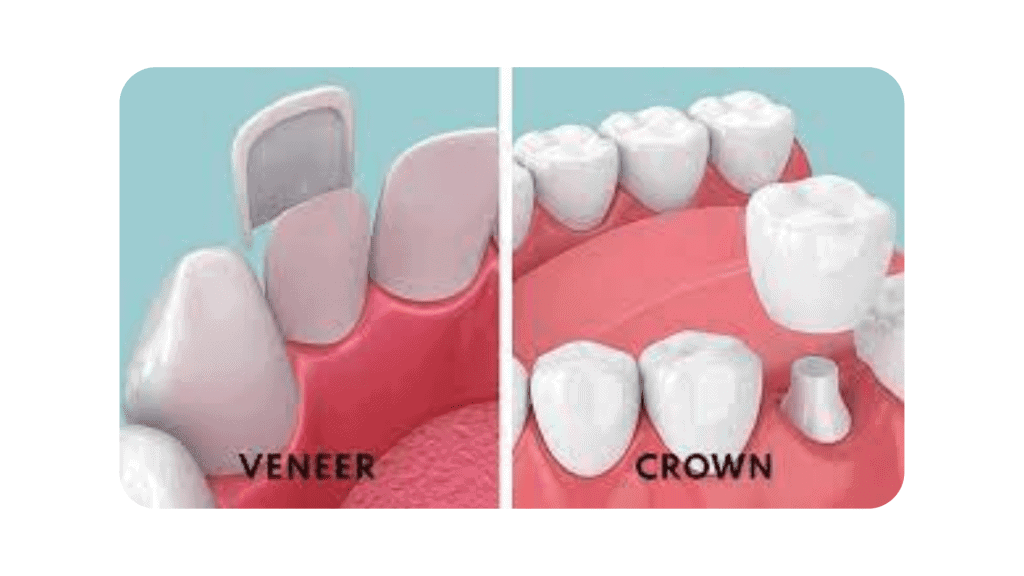Veneers vs. Crowns: Achieving Perfection for Your Teeth
Understanding Veneers and Crowns
To achieve a perfect smile, it’s important to understand the difference between veneers and crowns. Both veneers and crowns are dental restorations that can improve the appearance and functionality of your teeth. Let’s explore what veneers and crowns are in more detail.
What Are Veneers?
Veneers are thin, custom-made shells that are designed to cover the front surface of the teeth. They are typically made from porcelain or composite resin, and they are bonded to the natural teeth using a dental adhesive. Veneers can be used to improve the appearance of teeth that are discolored, chipped, misaligned, or worn down.
Porcelain veneers are known for their natural appearance and durability. They are stain-resistant and can mimic the translucency of natural teeth. Composite veneers, on the other hand, are made from a tooth-colored resin material that is directly applied and shaped on the teeth. They are a more affordable option but may not last as long as porcelain veneers. To learn more about the different types of veneers and their unique features, check out our article on veneers before and after.
What Are Crowns?
Crowns, also known as dental caps, are tooth-shaped restorations that cover the entire visible portion of a tooth. Unlike veneers, which only cover the front surface, crowns encapsulate the entire tooth structure. They are typically made from porcelain, metal, or a combination of both.
Crowns are recommended for teeth that are severely damaged, decayed, weakened, or have undergone root canal treatment. They provide strength, protection, and support to the natural teeth. Porcelain crowns are popular due to their natural appearance and ability to blend seamlessly with the surrounding teeth. Metal crowns, such as those made of gold or silver alloys, are durable and often used for back teeth where aesthetics are not a primary concern. To learn more about the different types of dental crowns, check out our article on porcelain veneers.
Understanding the differences between veneers and crowns is the first step in making an informed decision about the best treatment option for your specific needs. Consulting with your dentist is essential to determine which option is most suitable for you. Your dentist will consider factors such as the condition of your teeth, your oral health, and your aesthetic goals. Additionally, your budget and long-term goals should also be taken into account. By considering all these aspects, you can make the right choice and achieve the perfect smile you desire.
Differences Between Veneers and Crowns
When it comes to achieving perfection for your teeth, veneers and crowns are two popular options. While both can enhance the appearance and functionality of your teeth, there are notable differences between the two. Let’s explore the material differences, procedure variances, and longevity and maintenance aspects of veneers and crowns.
Material Differences
One significant difference between veneers and crowns lies in the materials used. Veneers are typically made of porcelain or composite resin. Porcelain veneers are known for their natural appearance and durability. They are stain-resistant and can closely mimic the color and translucency of natural teeth. On the other hand, composite veneers are a more affordable option. They are made of a tooth-colored resin material and can be directly applied and sculpted onto the teeth.
Crowns, on the other hand, are usually made of porcelain-fused-to-metal (PFM), ceramic, or zirconia. PFM crowns consist of a metal base covered with a layer of porcelain, providing strength and aesthetics. Ceramic and zirconia crowns offer excellent aesthetics and are metal-free options. The choice of material depends on various factors such as the location of the tooth, biting forces, and personal preference.
Procedure Variances
The procedures for placing veneers and crowns also differ. Veneers require minimal tooth preparation, with a thin layer of enamel being removed to accommodate the thickness of the veneer. This process is irreversible and may require local anesthesia. After tooth preparation, impressions are taken and sent to a dental laboratory for the fabrication of custom veneers. Once ready, the veneers are bonded to the front surface of the teeth, resulting in a transformed smile.
Crowns, on the other hand, require more extensive tooth preparation. A larger portion of the tooth structure is removed to make space for the crown. This process may require local anesthesia. Similar to veneers, impressions are taken and sent to a dental laboratory for crown fabrication. In the meantime, a temporary crown is placed to protect the prepared tooth. Once the permanent crown is ready, it is cemented onto the tooth, restoring its function and appearance.
Longevity and Maintenance
When considering veneers vs. crowns, it’s important to understand their longevity and maintenance requirements. While both veneers and crowns are durable, crowns tend to be more resistant to fracture and wear due to their thicker structure.
Veneers, when well-maintained, can last for an average of 10-15 years or even longer. However, they may require replacement or repair if chipped or damaged. It’s important to avoid habits like biting on hard objects or opening packages with your teeth to prolong their lifespan. Regular dental check-ups and proper oral hygiene practices are essential for maintaining the longevity of veneers. For more information on how long veneers can last, refer to our article on how long do veneers last.
Crowns, on the other hand, have a longer average lifespan of 15-20 years or more. Like veneers, they require regular dental visits and good oral hygiene practices to ensure their longevity. It’s important to note that both veneers and crowns may require periodic adjustments or replacements over time.
In summary, while veneers and crowns can both enhance the appearance and functionality of your teeth, they have distinct material differences, procedure variances, and longevity and maintenance aspects. Consulting with your dentist is crucial in determining the most suitable option based on your individual needs and goals. Consider factors such as the condition of your teeth, desired outcome, and budget to make an informed choice that will help you achieve the perfect smile.
Indications for Veneers vs. Crowns
When it comes to enhancing the appearance and functionality of your teeth, both veneers and crowns offer viable solutions. However, the decision between the two depends on various factors, including the specific dental condition and desired outcome. Let’s explore the indications for veneers and crowns to help you make an informed choice.
Cases Where Veneers Are Recommended
Veneers are an excellent option for individuals looking to improve the aesthetics of their smile. They are thin, custom-made shells that are bonded to the front surface of the teeth, providing a natural and attractive appearance. Veneers can address a range of cosmetic concerns, including:
| Indications for Veneers |
|---|
| Discolored or stained teeth |
| Chipped or worn teeth |
| Uneven or misaligned teeth |
| Gaps between teeth |
| Irregularly shaped teeth |
Veneers can be made from different materials, such as porcelain veneers or composite veneers. Porcelain veneers are highly durable and resistant to stains, offering long-lasting results. Composite veneers, on the other hand, are more affordable and can be applied in a single visit to the dentist.
It’s important to note that veneers are primarily a cosmetic solution and may not be suitable for teeth with extensive damage or decay. In such cases, crowns may be a more suitable option.
Cases Where Crowns Are Recommended
Crowns, also known as caps, are dental restorations that cover the entire visible portion of a tooth. They are typically recommended for cases where the tooth is significantly damaged, weakened, or has undergone root canal treatment. Crowns provide both functional and aesthetic benefits and are commonly used in the following situations:
| Indications for Crowns |
|---|
| Severely decayed teeth |
| Fractured or broken teeth |
| Teeth with large fillings |
| Teeth with root canal treatment |
| Teeth with significant discoloration |
Crowns can be made from various materials, including porcelain-fused-to-metal, all-ceramic, or metal alloys. The choice of material depends on factors such as the location of the tooth and the desired appearance.
Unlike veneers, crowns require more tooth structure removal to accommodate the restoration. This makes them a suitable option for cases where the tooth needs structural support or protection.
To determine whether veneers or crowns are the right choice for your specific dental condition, it’s essential to consult with your dentist. They will evaluate your teeth, discuss your goals, and recommend the most appropriate treatment plan. Additionally, factors such as your budget, dental insurance coverage, and long-term expectations should also be considered.
When it comes to achieving perfect teeth, both veneers and crowns can provide significant improvements. By understanding the indications and benefits of each option, you can work with your dentist to choose the treatment that aligns with your oral health goals. Remember, whether you opt for veneers or crowns, maintaining good oral hygiene practices and regular dental check-ups are essential for long-term success.
Making the Right Choice
When it comes to choosing between veneers and crowns, it’s essential to consult with your dentist to make an informed decision. Your dentist is the best person to assess your oral health, understand your specific needs, and guide you towards the most suitable option. Additionally, considering your budget and goals will also play a significant role in making the right choice.
Consulting with Your Dentist
Before deciding between veneers and crowns, schedule a consultation with your dentist. During this appointment, your dentist will examine your teeth, assess your oral health, and discuss your desired outcome. They will consider factors such as the condition of your teeth, the extent of damage or discoloration, and any underlying oral health issues.
Your dentist will explain the benefits, limitations, and potential risks associated with both veneers and crowns. They will also discuss the different types of veneers, such as porcelain veneers and composite veneers, and their respective advantages. Based on their professional expertise and your individual situation, your dentist will provide their recommendation and explain the reasons behind it.
Considering Your Budget and Goals
Apart from your dentist’s recommendation, it’s important to consider your budget and goals when choosing between veneers and crowns. While both options can enhance the appearance of your teeth, they differ in terms of procedure complexity and cost.
Veneers tend to be more expensive than crowns due to the customization involved and the use of high-quality materials. However, they offer a natural-looking and long-lasting solution that can transform the appearance of your smile. Additionally, veneers require minimal alteration of your natural teeth, making them a more conservative option.
On the other hand, crowns are a suitable choice for teeth with significant damage or structural issues. They provide better coverage and protection for heavily compromised teeth. Crowns are typically less expensive compared to veneers, but they involve more extensive tooth preparation.
Considering your goals is crucial in determining whether veneers or crowns will help you achieve the desired outcome. If you’re primarily concerned about improving the appearance of your teeth, veneers may be the ideal choice. However, if your primary goal is to restore functionality and strengthen damaged teeth, crowns may be more suitable.
By consulting with your dentist and taking into account your budget and goals, you can make an informed decision between veneers and crowns. Remember, the ultimate goal is to achieve a healthy and beautiful smile that meets both your functional and aesthetic needs.







